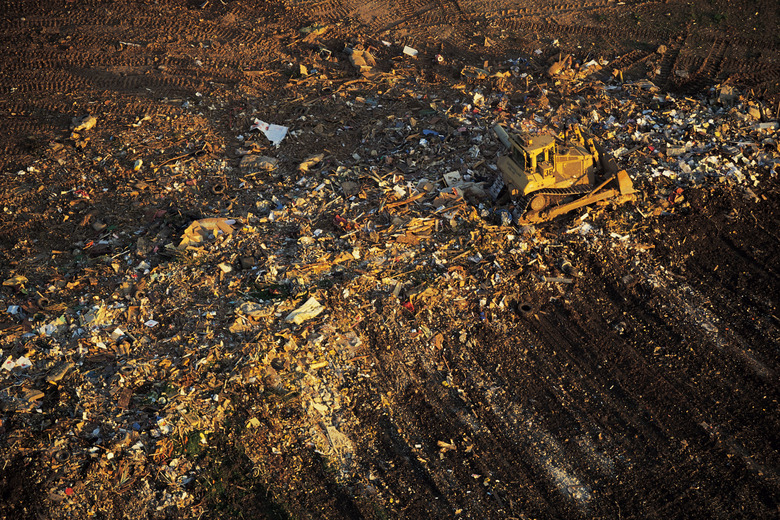Things Which Cannot Be Recycled
Rinsing out glass jars, breaking down cardboard boxes, tossing newspapers into the bin: these have become second nature to a lot of people. According to the Environmental Protection Agency, in 2011 about 1/3 of American's trash was recycled and composted. That's 87 million tons of refuse. If people are dedicated and willing to put in some extra time and effort, municipal collectors, recycling centers and individuals can repurpose an extraordinary number of materials. However, some things are still difficult to put to new uses.
Styrofoam
Styrofoam
Expanded polystyrene, what we usually call Styrofoam, is commonly used for packaging and protecting foods and goods. Though some EPS containers are labeled with a number 6 for recycling, most community recycling programs don't accept them. It's possible to recycle EPS, but cups and plates often still have food and drink particles clinging to them. Soiled materials can't be recycled. Also, repurposing EPS is a difficult process, while demand for the finished product is low. About half of it is used to make more packing material. Some communities do accept clean, white EPS if you take it to a recycling center, and some recyclers accept it through the mail. Mail and packing stores may take donations of packing peanuts.
Dirty or Coated Paper and Cardboard
Dirty or Coated Paper and Cardboard
Paper and cardboard are commonly recycled materials. However, they must be clean. Anything attached to paper and cardboard, such as food, grease, paint or mold, contaminates the product so that it can't be recycled. For example, dirty napkins and paper towels, pet food bags and used pizza boxes aren't accepted. Also, don't recycle paper or cardboard with a waxy or shiny coating, including foil or glittery wrapping paper, waxed paper and waxed cups.
Some Plastics
Some Plastics
Even though many kinds of plastic can be recycled, some are not acceptable. Don't put any plastic without a recycling number into your bin. This includes bubble wrap, food-storage bags, trash bags, plastic wrap, cereal bags, chip bags and toys. Most plastics labeled with recycling number seven, like 5-gallon water bottles, sunglasses and electronics cases, are not reusable. Plastic screw tops, such as those from soda and water bottles, can't be reclaimed. Those plastic-like Tyvek mailing envelopes are also not recyclable.
Household Glass
Household Glass
Glass food containers, rinsed well, are often recycled. If they are broken, though, don't put them in the bin. It's hard to keep the small pieces separated from other materials. If tiny glass bits get mixed in with paper and plastic, the recyclables can become contaminated. Also, window glass, mirrors, ceramics and glass cooking dishes shouldn't be put into the bin. None of these can be recycled, and they are easily breakable. Although the curvy compact fluorescent light bulbs are energy savers, recycling them is tricky. Inside there's a little mercury, which is a toxic chemical. Some local communities and stores have special recycling programs just for CFL bulbs.
References
- MNN: Recycle Styrofoam Cups: Is It Possible?
- Monroe County: Handling Information: Styrofoam
- Green Citizen: Styrofoam Recycling Has Come to the San Francisco Bay Area!
- Office of Environmental Health and Safety: Non-Recyclable Material List
- OPB: Tips On Recycling Holiday Wrapping Paper
- Waste-free Blog: Recyclable vs. Compostable
- MNN: What's This? 30 Things You Should Never Compost or Recycle
- MNN: 5 Ways to Dispose of Old CFLs
Cite This Article
MLA
Sherwood, Susan. "Things Which Cannot Be Recycled" sciencing.com, https://www.sciencing.com/things-cannot-recycled-6255/. 24 April 2017.
APA
Sherwood, Susan. (2017, April 24). Things Which Cannot Be Recycled. sciencing.com. Retrieved from https://www.sciencing.com/things-cannot-recycled-6255/
Chicago
Sherwood, Susan. Things Which Cannot Be Recycled last modified August 30, 2022. https://www.sciencing.com/things-cannot-recycled-6255/
